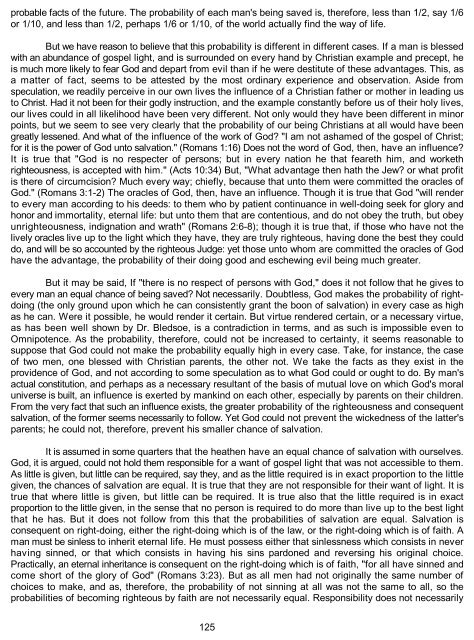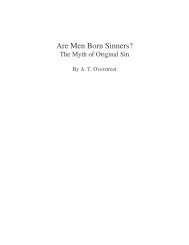Foreknowledge by Joel Hayes - Library of Theology
Foreknowledge by Joel Hayes - Library of Theology
Foreknowledge by Joel Hayes - Library of Theology
You also want an ePaper? Increase the reach of your titles
YUMPU automatically turns print PDFs into web optimized ePapers that Google loves.
probable facts <strong>of</strong> the future. The probability <strong>of</strong> each man's being saved is, therefore, less than 1/2, say 1/6<br />
or 1/10, and less than 1/2, perhaps 1/6 or 1/10, <strong>of</strong> the world actually find the way <strong>of</strong> life.<br />
But we have reason to believe that this probability is different in different cases. If a man is blessed<br />
with an abundance <strong>of</strong> gospel light, and is surrounded on every hand <strong>by</strong> Christian example and precept, he<br />
is much more likely to fear God and depart from evil than if he were destitute <strong>of</strong> these advantages. This, as<br />
a matter <strong>of</strong> fact, seems to be attested <strong>by</strong> the most ordinary experience and observation. Aside from<br />
speculation, we readily perceive in our own lives the influence <strong>of</strong> a Christian father or mother in leading us<br />
to Christ. Had it not been for their godly instruction, and the example constantly before us <strong>of</strong> their holy lives,<br />
our lives could in all likelihood have been very different. Not only would they have been different in minor<br />
points, but we seem to see very clearly that the probability <strong>of</strong> our being Christians at all would have been<br />
greatly lessened. And what <strong>of</strong> the influence <strong>of</strong> the work <strong>of</strong> God? "I am not ashamed <strong>of</strong> the gospel <strong>of</strong> Christ;<br />
for it is the power <strong>of</strong> God unto salvation." (Romans 1:16) Does not the word <strong>of</strong> God, then, have an influence?<br />
It is true that "God is no respecter <strong>of</strong> persons; but in every nation he that feareth him, and worketh<br />
righteousness, is accepted with him." (Acts 10:34) But, "What advantage then hath the Jew? or what pr<strong>of</strong>it<br />
is there <strong>of</strong> circumcision? Much every way; chiefly, because that unto them were committed the oracles <strong>of</strong><br />
God." (Romans 3:1-2) The oracles <strong>of</strong> God, then, have an influence. Though it is true that God "will render<br />
to every man according to his deeds: to them who <strong>by</strong> patient continuance in well-doing seek for glory and<br />
honor and immortality, eternal life: but unto them that are contentious, and do not obey the truth, but obey<br />
unrighteousness, indignation and wrath" (Romans 2:6-8); though it is true that, if those who have not the<br />
lively oracles live up to the light which they have, they are truly righteous, having done the best they could<br />
do, and will be so accounted <strong>by</strong> the righteous Judge: yet those unto whom are committed the oracles <strong>of</strong> God<br />
have the advantage, the probability <strong>of</strong> their doing good and eschewing evil being much greater.<br />
But it may be said, If "there is no respect <strong>of</strong> persons with God," does it not follow that he gives to<br />
every man an equal chance <strong>of</strong> being saved? Not necessarily. Doubtless, God makes the probability <strong>of</strong> rightdoing<br />
(the only ground upon which he can consistently grant the boon <strong>of</strong> salvation) in every case as high<br />
as he can. Were it possible, he would render it certain. But virtue rendered certain, or a necessary virtue,<br />
as has been well shown <strong>by</strong> Dr. Bledsoe, is a contradiction in terms, and as such is impossible even to<br />
Omnipotence. As the probability, therefore, could not be increased to certainty, it seems reasonable to<br />
suppose that God could not make the probability equally high in every case. Take, for instance, the case<br />
<strong>of</strong> two men, one blessed with Christian parents, the other not. We take the facts as they exist in the<br />
providence <strong>of</strong> God, and not according to some speculation as to what God could or ought to do. By man's<br />
actual constitution, and perhaps as a necessary resultant <strong>of</strong> the basis <strong>of</strong> mutual love on which God's moral<br />
universe is built, an influence is exerted <strong>by</strong> mankind on each other, especially <strong>by</strong> parents on their children.<br />
From the very fact that such an influence exists, the greater probability <strong>of</strong> the righteousness and consequent<br />
salvation, <strong>of</strong> the former seems necessarily to follow. Yet God could not prevent the wickedness <strong>of</strong> the latter's<br />
parents; he could not, therefore, prevent his smaller chance <strong>of</strong> salvation.<br />
It is assumed in some quarters that the heathen have an equal chance <strong>of</strong> salvation with ourselves.<br />
God, it is argued, could not hold them responsible for a want <strong>of</strong> gospel light that was not accessible to them.<br />
As little is given, but little can be required, say they, and as the little required is in exact proportion to the little<br />
given, the chances <strong>of</strong> salvation are equal. It is true that they are not responsible for their want <strong>of</strong> light. It is<br />
true that where little is given, but little can be required. It is true also that the little required is in exact<br />
proportion to the little given, in the sense that no person is required to do more than live up to the best light<br />
that he has. But it does not follow from this that the probabilities <strong>of</strong> salvation are equal. Salvation is<br />
consequent on right-doing, either the right-doing which is <strong>of</strong> the law, or the right-doing which is <strong>of</strong> faith. A<br />
man must be sinless to inherit eternal life. He must possess either that sinlessness which consists in never<br />
having sinned, or that which consists in having his sins pardoned and reversing his original choice.<br />
Practically, an eternal inheritance is consequent on the right-doing which is <strong>of</strong> faith, "for all have sinned and<br />
come short <strong>of</strong> the glory <strong>of</strong> God" (Romans 3:23). But as all men had not originally the same number <strong>of</strong><br />
choices to make, and as, therefore, the probability <strong>of</strong> not sinning at all was not the same to all, so the<br />
probabilities <strong>of</strong> becoming righteous <strong>by</strong> faith are not necessarily equal. Responsibility does not necessarily<br />
125






